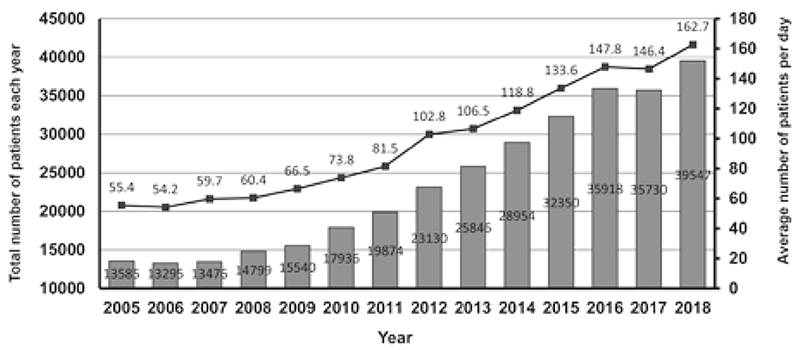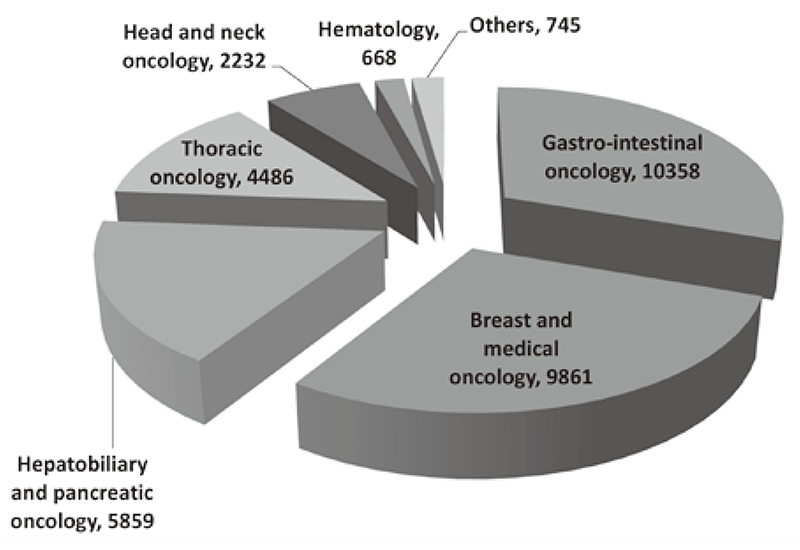Annual Report 2018
Outpatient Treatment Center
Masafumi Ikeda, Koichi Goto, Takayuki Yoshino, Mukouhara Toru, Susumu Okano, Yosuke Minami, Kayoko Nakata, Naomi Ito, Hisanaga Nomura, Nahoko Yoshino, Sachiko Doi, Yukie Kimura
Introduction
The Outpatient Treatment Center is responsible for anticancer treatment, such as chemotherapy, molecular targeted agents, and hormonal therapy for patients with all kinds of cancer. Our basic policy is to provide high-quality anticancer treatment and to support the lifestyles of patients and their families. Our goals are 1) To provide appropriate and satisfying management of chemotherapy, and 2) To share the mind of outpatients with our staff. We can provide highquality and comfortable treatment with the collaboration of medical oncologists, nurses, pharmacists, medical social workers, and clinical research coordinators.
The Team and What We Do
Our team consists of one director, five medical oncologists, one nurse manager, two deputy nurses, 23 nurses, two chief pharmacists, two pharmacists, one resident pharmacist, two assistant nurses, and three reception staff. The Outpatient Treatment Center has a total of 73 beds including five beds for infusions or blood transfusions. In 2018, a total of 39,547 patients received anticancer treatment, and the average number of patients per day was 162.7 patients, which was the highest recorded number (Figure 1). As the number of patients in the outpatient treatment center increased, the number of nurses was increased. The detailed numbers for each department are 10,358 in gastro-intestinal oncology, 9,861 in breast and medical oncology, 5,859 in hepatobiliary and pancreatic oncology, 4,486 in thoracic oncology, 2,232 in head and neck oncology, 668 in hematology, and 745 in others (Figure 2). The monthly steering committee is held on the third Monday, from 16:30-17:00, every month with the participation of medical oncologists, nurses, pharmacists, clinical research coordinators, and hospital clerks. We discuss the monthly activities and problems of this center raised by each section, such as nursing, pharmacy, and clinical trials, and plan solutions to these problems.
SBefore new regimens and clinical trials are initiated in this center, staff meetings with medical oncologists, nurses, and pharmacists are held to safely and appropriately manage these treatments.
We have a telephone consultation service (Hot line) for outpatients who have received anticancer treatment in this center. Pharmacists and nurses, who are highly trained in outpatient treatment, utilize countermeasures for adverse events and answer any queries from patients or their families by telephone. If the consultations are serious, they transfer them to medical oncologists. This service was started in 2008 and gradually increased. In 2018, a total of 2,693 calls were received. This service contributes to the prevention of serious adverse events and relieve patients' anxiety.


Research activities
In order to manage the beds efficiently, the blood sampling frames for early morning were expanded and the activity around the beds was increased in the morning. And we promoted the usage of the blood sampling frame the day before for further improvement of the activity around morning beds. Also, we changed the nursing record methods to enable continuous simple and effective nursing.
Education
We train nurses and pharmacists with specialist knowledge who can intensify the skill of self-care for patients and properly resolve problems related to the patients and their families during anticancer treatment.
Future prospects
We always efficiently manage bed control at the outpatient treatment center, and try to resolve the problem of waiting time for patients. We reevaluated the contents of regimens that were only available in admission, such as introducing short hydration for long-time patients requiring regimens, and adjusted the regimens so they could be received in the outpatient treatment center. Thus, we are also aiming to accept additional patients who need to be treated for chemotherapy at the outpatient clinic. Furthermore, a lot of new regimens and clinical trials are also being accepted.
